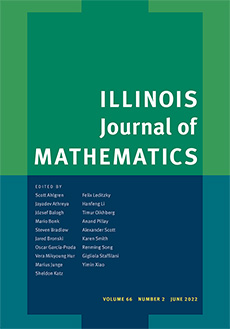Abstract
We consider sequences, of positive density $C$, of positive integers $s$ that are postulated to have the property that %%%%%%%%%%%%%%%%%%%% \begin{align} \notag S(x;a,k) &= \sum_{\substack{s\leq x \\ s\equiv a, \mod k}} 1 = f(a,k)x+O\left(x \log^{-A}x\right) \end{align} %%%%%%%%%%%%%%%%%%%% for any positive constant $A$. Let %%%%%%%%%%%%%%%%%%%% \begin{align} \notag G(x,Q) &= \sum_{k \leq Q} \sum_{0<a\leq k}E^2(x;a,k) \quad (Q\leq x), \end{align} %%%%%%%%%%%%%%%%%%%% where $E(x;a,k) = S(x;a,k) - f(a,k)x.$ Then previously we had shewn that %%%%%%%%%%%%%%%%%%%% \begin{align} \notag G(x,Q) &= D\{1+o(1)\}x^2+O\left(x^2\log^{-A}x\right) \quad (Q/x \rightarrow 0). \end{align} %%%%%%%%%%%%%%%%%%%% When $D=0,$ many particular examples of which are known, this formula supplies little information about $G(x,Q)$ and about how small it can be. The first result obtained in this paper is the lower bound
\begin{align} \notag G(x;Q) &\geq \frac{1}{12}\{3C-2C^2+\min \nolimits^2(C,1-C)+o(1)\}Q^2+o(x^2\log^{-A}x) \end{align}
that is best possible when $C=\frac{1}{2}$ or 1.
The other subject of the paper is the sum
\begin{align} \notag G_\lambda(x,Q) &= \sum_{k\leq Q} \sum_{0<a \leq \lambda k}E^2(x;a,k) \quad (\lambda <1) \end{align}
and its connection with $G(x,Q).$ If $G(x,Q)/Q^2$ be bounded, it is demonstrated that the expected limiting equality of $G_\lambda(x,Q)$ and $\lambda G(x,Q)$ can be false. On the other hand, it is shewn that this equality holds in the appropriate sense for any sequence of $Q$ for which $G(x,Q)/Q^2 \rightarrow \infty.$
Citation
C. Hooley. "On the Barban-Davenport-Halberstam theorem. {XVIII}." Illinois J. Math. 49 (2) 581 - 643, Summer 2005. https://doi.org/10.1215/ijm/1258138036
Information





